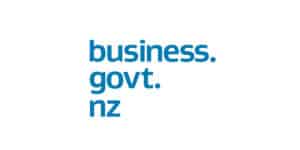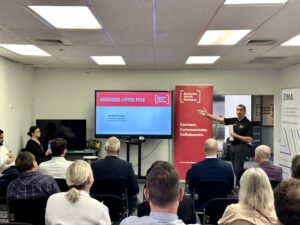Business After Five: Meet the Candidates
Monday 12 September 2022
Invitees (alphabetical, by surname)
Viv Beck
Gary Brown
Wayne Brown
Efeso Collins (did not RSVP)
Michael Kampkes
John Lehmann (RSVP but did not attend)
Craig Lord
Michael Morris
On the day the government announced that it was retiring its Covid Protection Framework, more than 50 local business owners, property owners, and other interested parties took the opportunity to hear first-hand the priorities and plans of several Auckland mayoral candidates.
BNZ Partners at 55 Constellation Drive was the perfect venue, with a conducive space to network and an ample seated area so attendees could comfortably listen to each speaker.
Welcoming guests, Kevin O’Leary drew the attending candidates’ names randomly from the hat to determine the speaking order. Each had five minutes to present, plus a Q+A lasting no more than two minutes.
Here is a summary of some of the key points from each speaker, plus a link to their official election websites.
Gary Brown, chair of Hibiscus and Bays Local Board
“Experience is quite important.” GB has owned four different businesses, including hospitality and one of the country’s largest mobile entertainment companies, and recognises that you are only as good as your staff. In the mayoral context, this means ensuring that everyone – Auckland Transport (AT), Auckland Council (AC), Tātaki Auckland Unlimited – understands the vision and has KPIs to achieve the required outcomes for all of Auckland, not just the CBD.
“The buck stops here.” As a business owner, GB understands the importance of accountability. Control needs to be returned to the CCOs, which need to recognise that outcomes have to be achieved as wanted.
“We need to reduce our debt, $11.2 billion at this moment.” Selling off assets is not the answer because if you do not have assets, there is nothing to borrow against. GB suggested that perhaps AC could even build on some areas and gain some revenue back.
“We must run it like a business, not like a social identity.” This should include auditors to monitor spending. “There needs to be accountability from the get-go, and that’s what I’ll bring to it.”
Michael Kampkes, founder of Citizens Against the Housing Act 2021
MK has been a builder since 2014, previously working in food supply, manufacturing and logistics.
He has signed a pledge that he will not raise rates over the CPI “because I think we can provide more service, and still achieve that by being more efficient.” KPIs need to be applied to Auckland Council.
“I have a policy around increasing affordable housing,” which he says is good for business because it people will have more money in their pockets to spend. MK believes property owners should be incentivised to populate or sell their properties. This would release up to 40,000 “ghost houses” into the market.
He also has various policies to encourage more people per house and better house utilisation.
“No light rail; I think that’s a vanity project.” Free up roads; electrify the fleet. “I’m as green as a green bean.”
Re. the “shattered” consultative process. Turning every single suburb into medium density is simply not acceptable. This needs to be limited to 20 per cent.
“Business needs a working democracy to flourish.”
Viv Beck, CEO of Heart of the City
VB is a first-generation Kiwi with a degree in economics and a varied career across the public and private sectors.
She recognises the disproportionate impact of Covid on businesses. It was this that motivated her to stand up for this role. Through consultation with many people, common issues are clear: transport and congestion, safety, housing and infrastructure, and council accountability. “It is important that someone has broad experience…but also [to be] constructive and collaborative, because you are only one vote.”
“What I want to see is a much more responsible organisation, respecting the needs of businesses, ensuring value for the ratepayer dollar, and cutting waste and red tape.” VB believes in practical, sensible decision making: light rail should be paused with priority should be given to rapid transit, traffic light alignment, focusing on clogged-up junctions, and electrifying the fleet.
Infrastructure for new housing should be “using the Millwater model” so that all resources, including children’s parks, are in place.
VB was asked why she had signed the Ratepayers Alliance Pledge. She said this was because there is too much waste; change needs to be made so AC works more efficiently. She does, however, not object to targeted rates for business associations.
Wayne Brown, former Far North Mayor
WB is an infrastructure engineer, previously the chair of Vector and Transpower (amongst others).
He referenced the legislation for Auckland’s super city. “Rodney Hide should have stuck to ballroom dancing, in my view.” None of the promises – greater efficiencies and better relationships with ratepayers – have happened. AC staff numbers have increased from 10,000 to 12,000. It is “top-heavy”. Sixty people in AC earn more than $300,000, 10 of whom are in AT and “amazingly, not one of them is a roading engineer”.
“The city is not safe.”
“I have a great track record of fixing big organisations in trouble.” He cited examples of three district health boards, two SOEs, two power companies, and a broadcast company. “They’ve all done well. And in all those cases, I’ve only had one vote on the board.”
WB is concerned about the overspending and lack of transparency of City Rail Link, suggesting that every $1 billion over budget is $500 per ratepayer, and that it is currently $2 billion over.
“Three Waters is plainly dumb.”
He also believes that the CBD needs to be cleared of cones, and cameras should be used to see which buses have nobody on them.
Craig Lord, former engineer and freelance media operator
“In engineering, we are common sense people…We are also problem solvers, and we know there are a lot of problems to solve.” CL wants to fault-find and then fix the issues.
The 2009 Royal Commission recommended that the Auckland super city have an independent performance services review auditor. No mayor has done this, but CL pledges that he will.
AC needs to remember that it is a core service provider. It is not there to be a social service nor a security firm. The system needs to change to be more cost-effective and efficient. CL would completely overhaul the preferred contractors system, back to the “old borough council style of working”. This would include giving more power back to the local boards.
CCOs need to be brought under control. Two AC committees are involved with this – CCO oversight and the appointments performance review – plus appropriate legislation. AT’s board can be changed, the CEO could be made to review its performance, and its statement of intent can be controlled by AC.
Responding to a question: CL stated that the CCOs are “out of control”. The “Have Your Say” approach is not working; it’s set up for pre-determined outcomes.
Michael Morris, Animal Justice Auckland
MM has a solid scientific background. As Auckland Mayor, he would give a voice to a “marginalised group” that no other candidate has ever spoken for: the animals that are “eaten, slaughtered, and tortured in their billions for something we don’t need.” Auckland must support its C40 Cities obligations to support plant-based eating. MM supports local contractors but would give preference to plant-based contractors. For example, small businesses creating nourishing but cheap vegetarian food.
MM’s other platforms are “justice for the environment” and “justice for marginalised – or less fortunate – humans”. He supports free public transport, which he likens to “a tax cut for those on lower incomes” and better public transport options, including pedestrians. He cited an example in south Auckland, where traffic flow was being prioritised over a pedestrian crossing primarily for children. “In what Universe is the life of children considered less important than traffic flow?” Prisoners are also “marginalised people”. MM, therefore, supports a specialised bus service for prison visitors as part of inmates’ rehabilitation
AucklandEventmayoral elections




